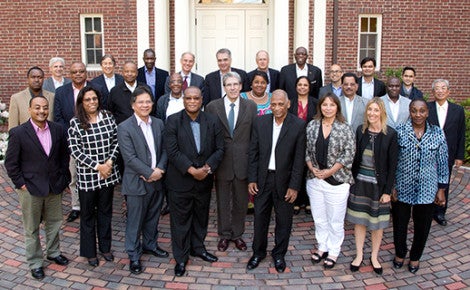June 16, 2015 — How to bridge the legendary gap between government aspirations and actual accomplishments? Donna Shalala told more than 70 health ministers at the keynote session of a Harvard forum to have a clear sense of what they want to achieve and how they plan to achieve it; to pursue ambitious goals with purpose and persistence; and to stay focused on end goals even while dealing with the routine work of government.
Shalala—former U.S. Secretary for Health and Human Services and current president and CEO of the Clinton Foundation—told the group that one of the toughest aspects of leadership is building shared values, effective relationships, and trust with the professional civil service and various stakeholders. How to get others on board to support your goals? Have a strong sense of conviction, Shalala said.

Shalala spoke to the ministers, as well as to current and former cabinet-level officials from around the world and to Harvard faculty, at the fourth annual Harvard Health Leaders’ Ministerial Forum, which convenes a select group of current health ministers from Africa, Latin America, and Southeast Asia for a five-day program focused on enhancing leadership effectiveness to enable sustainable improvements in public health services and outcomes. By the end of the program, each minister completes a plan for strengthening the public health sector in his or her home country.
Put one foot in front of the other
Harvard T.H. Chan School of Public Health Dean and former Mexico health minister Julio Frenk advised ministers that the way to achieve big goals in government is to relentlessly put one foot in front of the other on the path to progress. He acknowledged that this requires compromise without sacrificing principle, as well as an ability to navigate the court of public opinion, and to take both praise and criticism without being swayed by emotion. Frenk also spoke of the loneliness of public office; the need for reliable information systems and a trusted top management group; and the importance of being accessible to lower-level officials and public constituencies.
At workshops led by senior Havard faculty and other international experts, ministers also learned about various countries’ experiences with health financing as well as about countries that have achieved substantial health improvements in recent years. Ministers were challenged to envision a legacy from their time in office that could contribute to lasting benefits for their nations. Additional sessions focused on effective planning, implementation, and monitoring of health systems.
“To see new directions”

Participants found the Minsterial Forum valuable for helping them set priorities for improving health and health systems on a national level. Namibian health minister Bernard Haufiku said he had only been in office a few months and that the gathering had helped clarify his vision for improving health in his country and how to implement that vision. Davit Sergeenko, health minister for the Balkan country of Georgia, said that the forum has enabled him to “look at issues deeper, systematically, and analytically, and to see new directions” in health policy. Fenton Ferguson of Jamaica said he had been in office for four years and regretted not being able to come to Harvard sooner. “I now have a much more clear sense of what is important and how I should prioritize my efforts,” he said.
The Harvard Health Leaders’ Ministerial Forum is a core component of the Ministerial Leadership in Health Program, which is a joint initiative of the Harvard T.H. Chan School of Public Health and Harvard’s Kennedy School. Sixty-seven health and finance ministers from 45 countries have participated in the program over the past four years.
photos: Martha Stewart
